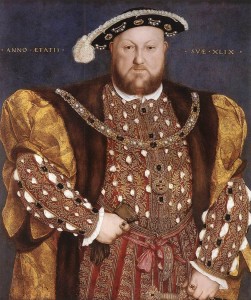 On 24th December 1545, King Henry VIII made his final speech to Parliament. Historian Robert Hutchinson describes it as “both measured and compelling”, and writes of how Henry wanted “to impart a stern message” to all of his subjects. Lord Chancellor Thomas Wriothesley would normally have given the address, but Wriothesley was unpopular at this time and the King wanted to address Parliament instead.
On 24th December 1545, King Henry VIII made his final speech to Parliament. Historian Robert Hutchinson describes it as “both measured and compelling”, and writes of how Henry wanted “to impart a stern message” to all of his subjects. Lord Chancellor Thomas Wriothesley would normally have given the address, but Wriothesley was unpopular at this time and the King wanted to address Parliament instead.
In this speech, Henry VIII chastised the Lords and the Commons for the divisions regarding religion, saying:
“Yet, although I with you, and you with me, be in this perfect love and concord, this friendly amity cannot continue, except you, my lords temporal, and you my lords spiritual, and you my loving subjects, study and take pains to amend one thing, which is surely amiss, and far out of order, to the which I most heartily require you; which is, that charity and concord is not among you, but discord and dissension beareth rule, in every place. St. Paul saith to the Corinthians, in the thirteenth chapter, charity is gentle, charity is not envious, charity is not proud, and so forth, in the said chapter. Behold then what love and charity is amongst you, when the one calleth the other heretic and anabaptist, and he calleth him again, papist, hypocrite, and pharisee. Be these tokens of charity amongst you? Are these the signs of fraternal love between you? No, no. I assure you, that this lack of charity amongst yourselves will be the hindrance and assuaging of the fervent love between us, as I said before, except this wound be salved, and clearly made whole.”
He then moved on to addressing the clergy:
“I must needs judge the fault and occasion of this discord to be partly by the negligence of you, the fathers, and preachers of the spirituality… I see and hear daily, that you of the clergy preach one against another, teach, one contrary to another, inveigh one against another, without charity or discretion. Some be too stiff in their old mumpsimus, other be too busy and curious in their new sumpsimus. Thus, all men almost be in variety and discord, and few or none do preach, truly and sincerely, the word of God, according as they ought to do. Shall I now judge you charitable persons doing this? No, no; I cannot so do. Alas! How can the poor souls live in concord, when you, preachers, sow amongst them, in your sermons, debate and discord? Of you they look for light, and you bring them to darkness. Amend these crimes, I exhort you, and set forth God’s word, both by true preaching, and good example-giving, or else I, whom God hath appointed his vicar, and high minister here, will see these divisions extinct, and these enormities corrected, according to my very duty, or else I am an unprofitable servant, and an untrue officer.”
He concluded by imploring them all to remember the true meaning of God’s word and to treat each other like brothers, putting their differences to one side:
“I am very sorry to know and hear how unreverently that most precious jewel, the word of God, is disputed, rhymed, sung, and jangled in every alehouse and tavern, contrary to the true meaning and doctrine of the same; and yet I am even as much sorry that the readers of the same follow it, in doing, so faintly and coldly. For of this I am sure, that charity was never so faint amongst you, and virtuous and godly living was never less used, nor was God himself, amongst christians, never less reverenced, honoured, or served. Therefore, as I said before, be in charity one with another, like brother and brother; love, dread, and serve God (to the which I, as your supreme head, and sovereign lord, exhort and require you); and then I doubt not, but that love and league, which I spoke of in the beginning, shall never be dissolved or broken between us. And, as touching the laws which be now made and concluded, I exhort you, the makers, to be as diligent in putting them into execution, as you were in making and furthering the same, or else your labour shall be in vain, and your commonwealth nothing relieved.”
You can read the full speech in the appendix of Volume I of “Dodd’s Church History of England from the Commencement of the Sixteenth Century to the Revolution in 1688” – see link in Notes and Sources below..
This was Henry VIII’s last appearance before Parliament, although he didn’t die until January 1547.
Notes and Sources
- Dodd, Charles (1839) Dodd’s Church History of England from the Commencement of the Sixteenth Century to the Revolution in 1688, Volume I, p. 450-454.
- The Last Days of Henry VIII, Robert Hutchinson, Chapter 7
